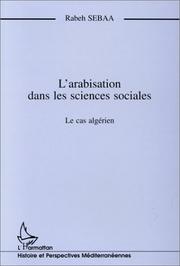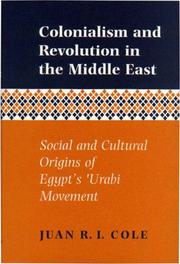| Listing 1 - 4 of 4 |
Sort by
|

ISBN: 2738446078 9782738446077 Year: 1996 Publisher: Paris : L'Harmattan,
Abstract | Keywords | Export | Availability | Bookmark
 Loading...
Loading...Choose an application
- Reference Manager
- EndNote
- RefWorks (Direct export to RefWorks)
Social sciences --- Arabic language --- Sciences sociales --- Arabe (Langue) --- Algeria. --- social sciences. --- Arabization. --- 18.73 modern Arabic language. --- Arabisierung. --- Hochschule. --- Sozialwissenschaften. --- Taalpolitiek. --- Arabisch. --- Frans. --- Sociale wetenschappen. --- Sciences humaines --- Arabe (langue) --- Enseignement supérieur --- HIGHER EDUCATION. --- SOCIAL SCIENCES. --- ARABIC LANGUAGE. --- ALGERIA. --- Study and teaching (Higher) --- Social aspects --- Aspect social --- Social aspects. --- Study and teaching (Higher). --- Etude et enseignement (supérieur) --- Aspect sociologique --- Algerien.
Book
ISBN: 9780691179100 0691179107 0691184186 069120313X 9780691184186 Year: 2018 Publisher: Princeton, NJ : Princeton University Press,
Abstract | Keywords | Export | Availability | Bookmark
 Loading...
Loading...Choose an application
- Reference Manager
- EndNote
- RefWorks (Direct export to RefWorks)
How did the medieval Middle East transform from a majority-Christian world to a majority-Muslim world, and what role did violence play in this process? Christian Martyrs under Islam explains how Christians across the early Islamic caliphate slowly converted to the faith of the Arab conquerors and how small groups of individuals rejected this faith through dramatic acts of resistance, including apostasy and blasphemy.Using previously untapped sources in a range of Middle Eastern languages, Christian Sahner introduces an unknown group of martyrs who were executed at the hands of Muslim officials between the seventh and ninth centuries CE. Found in places as diverse as Syria, Spain, Egypt, and Armenia, they include an alleged descendant of Muhammad who converted to Christianity, high-ranking Christian secretaries of the Muslim state who viciously insulted the Prophet, and the children of mixed marriages between Muslims and Christians. Sahner argues that Christians never experienced systematic persecution under the early caliphs, and indeed, they remained the largest portion of the population in the greater Middle East for centuries after the Arab conquest. Still, episodes of ferocious violence contributed to the spread of Islam within Christian societies, and memories of this bloodshed played a key role in shaping Christian identity in the new Islamic empire. Christian Martyrs under Islam examines how violence against Christians ended the age of porous religious boundaries and laid the foundations for more antagonistic Muslim-Christian relations in the centuries to come.
Christianity and other religions --- Christian martyrs --- Islam --- 235.3*7 --- 297.116*1 --- 297.116*1 Relatie Islam tot Christendom --- Relatie Islam tot Christendom --- 235.3*7 Martelaren --- Martelaren --- Mohammedanism --- Muhammadanism --- Muslimism --- Mussulmanism --- Religions --- Muslims --- Martyrs --- Martyrdom --- Relations&delete& --- Christianity --- Relations --- Christian martyrs. --- Violence --- RELIGION / History. --- Martyrdom (Islam) --- Muslim martyrs --- Martyrdom (Christianity) --- Islam. --- Christianity. --- Religious aspects --- Christianity and other religions - Islam --- Christian martyrs - Islamic countries --- Islam - Relations - Christianity --- Islamic Empire --- History. --- Anthony al-Qurash ī. --- Arab culture. --- Arabization. --- Christian Middle East. --- Christian blasphemy. --- Christian identity. --- Christians. --- Islamic empire. --- Islamization. --- Middle East. --- Muslims. --- apostasy. --- apostates. --- bloodshed. --- capital punishment. --- early Islamic caliphate. --- early Middle Ages. --- early medieval Middle East. --- hagiography. --- late antiquity. --- martyrdom. --- martyrologies. --- martyrs. --- medieval Middle East. --- punitive burning. --- religious conversion. --- religious differentiation. --- religious persecution. --- social differentiation. --- social protest. --- theological protest. --- violence.

ISBN: 1282457764 9786612457760 1400820901 1400811279 9781400811274 9781400820900 9780691056838 0691056838 140080132X Year: 1993 Publisher: Princeton, N.J. Princeton University Press
Abstract | Keywords | Export | Availability | Bookmark
 Loading...
Loading...Choose an application
- Reference Manager
- EndNote
- RefWorks (Direct export to RefWorks)
In this book Juan R. I. Cole challenges traditional elite-centered conceptions of the conflict that led to the British occupation of Egypt in September 1882. For a year before the British intervened, Egypt's viceregal government and the country's influential European community had been locked in a struggle with the nationalist supporters of General Ahmad al-`Urabi. Although most Western observers still see the `Urabi movement as a "revolt" of junior military officers with only limited support among the Egyptian people, Cole maintains that it was a broadly based social revolution hardly underway when it was cut off by the British. While arguing this fresh point of view, he also proposes a theory of revolutions against informal or neocolonial empires, drawing parallels between Egypt in 1882, the Boxer Rebellion in China, and the Islamic Revolution in modern Iran. In a thorough examination of the changing Egyptian political culture from 1858 through the `Urabi episode, Cole shows how various social strata--urban guilds, the intelligentsia, and village notables--became "revolutionary." Addressing issues raised by such scholars as Barrington Moore and Theda Skocpol, his book combines four complementary approaches: social structure and its socioeconomic context, organization, ideology, and the ways in which unexpected conjunctures of events help drive a revolution.
Social classes --- Class distinction --- Classes, Social --- Rank --- Caste --- Estates (Social orders) --- Social status --- Class consciousness --- Classism --- Social stratification --- History --- ʻUrābī, Aḥmad, --- Egypt --- Aḥmad ʻArābī, --- Aḥmad ʻIrābī, --- Aḥmad ʻUrābī, --- ʻArābī, Aḥmad, --- ʻArabi Pasha, --- ʻIrābī, Aḥmad, --- Ourabi, Ahmad, --- Ourabi, Ahmed, --- ʻUrābī Pasha, --- أحمد عرابي --- عرابي، أحمد، --- عرابي، احمد --- عرابي، احمد، --- عرابى، أحمد، --- History of Africa --- anno 1800-1899 --- Abbasid Caliphate. --- Activism. --- Al-Ahram. --- Al-Mahdi. --- Algerian War. --- Ancien Régime. --- Anti-imperialism. --- Arabization. --- Banditry. --- Before the Revolution. --- Bourgeoisie. --- British Empire. --- Bureaucrat. --- Byzantine Empire. --- Caliphate. --- Capitalism. --- Censorship. --- Central Asia. --- Circassians. --- Colonialism. --- Conspiracy theory. --- Constitutionalist (UK). --- Corporatism. --- Counter-revolutionary. --- Decolonization. --- Despotism. --- Economic interventionism. --- Education in Egypt. --- Egyptian Government. --- Egyptian crisis (2011–14). --- Egyptian law. --- Egyptians. --- Elie Kedourie. --- Emir. --- English Revolution. --- Expansionism. --- Expatriate. --- Extraterritoriality. --- Foreign policy of the United States. --- From Time Immemorial. --- Ideology. --- Imperial Ambitions. --- Imperialism. --- Indian Rebellion of 1857. --- Infant industry. --- Insurgency. --- Intelligentsia. --- International relations. --- Iranian Revolution. --- Jamal ad-Din al-Afghani. --- Jingoism. --- Khedive. --- Labor aristocracy. --- Liberalism (book). --- Liberalism. --- Loan shark. --- Mercantilism. --- Middle East. --- Mirrors for princes. --- Nativism (politics). --- Neocolonialism. --- New Political Economy (journal). --- Newspaper. --- On Revolution. --- Orientalism. --- Ottoman Empire. --- Pan-Islamism. --- Peasant. --- Pogrom. --- Political revolution. --- Politics. --- Poll tax. --- Populism. --- Radicalism (historical). --- Reformism. --- Revolution. --- Revolutionary movement. --- Ruhollah Khomeini. --- Salman Rushdie. --- Sayyid. --- Secularization. --- Social revolution. --- State within a state. --- States and Social Revolutions. --- Subaltern (postcolonialism). --- Suez Canal Company. --- Suez Crisis. --- Tanzimat. --- Tax collector. --- Tax. --- The Imperialism of Free Trade. --- Tyrant. --- Upper Egypt. --- Urban riots. --- Use tax. --- Usury. --- Warfare. --- Westernization. --- Young Turk Revolution. --- Zoroaster. --- Urabi, Ahmad,
Book
ISBN: 1789629578 1789624371 178962021X 9781789624373 9781789629576 9781789620214 Year: 2019 Publisher: Liverpool
Abstract | Keywords | Export | Availability | Bookmark
 Loading...
Loading...Choose an application
- Reference Manager
- EndNote
- RefWorks (Direct export to RefWorks)
Contesting the Classroom is the first scholarly work to analyze both how Algerian and Moroccan novels depict the postcolonial classroom, and how postcolonial literatures are taught in Morocco and Algeria. Drawing on a corpus of contemporary novels in French and Arabic, it shows that authors imagined the fictional classroom as a pluralistic and inclusive space, often at odds with the narrow nationalist vision of postcolonial identity. Yet when authors wrote about the school, they also had to consider whether their work would be taught in schools. As this book's original research on the teaching of literature shows, Moroccan and Algerian schools have largely failed to promote the works of local authors in public school curricula. This situation has dramatically altered literary portraits of education: novels marginalized in the public education system must creatively reimagine what pedagogy looks like and where it can take place. In illuminating a literary corpus neglected by political scientists and sociologists, Contesting the Classroom shows that novels about the school are an important source of counter-narrative about education and national identity. At the same time, by demonstrating how education has influenced writing styles, this work reframes the classroom as a necessary cultural context for scholars of postcolonial literature.
Moroccan fiction (French) --- Algerian fiction (French) --- Moroccan fiction (Arabic) --- Algerian fiction (Arabic) --- Education in literature. --- Schools in literature --- French fiction --- Moroccan literature (French) --- Algerian literature (French) --- History and criticism. --- 1900-2099 --- Morocco. --- Algeria. --- 1958-1962 --- al-Dzāyīr --- al-Jazāʼir --- Algérie --- Algerien --- Algeriet --- Alg'eryah --- Algieria --- Algierska Republika Ludowo-Demokratyczna --- Alg'iryah --- Alzhir --- Alžir --- Argelia --- Cezayir --- Democratic and Popular Republic of Algeria --- Democratic Republic of Algeria --- Dżumhurija al-Dżazajrija asz-Szaabija ad-Dimukratija --- Gouvernement général de l'Algérie --- Jumhūrīyah al-Jazāʼirīyah al-Dīmuqrāṭīyah wa-al-Shaʻbīyah --- Jumhūrīyah al Jazāʼirīyah ash Shaʻbīyah --- People's Democratic Republic of Algeria --- République algérienne démocratique et populaire --- Empire chérifien --- Kingdom of Morocco --- Kingdom of Morrocco --- Maghrib --- Mamlaka al-Maghrebia --- Mamlakah al-Maghribīyah --- Maroc --- Marocko --- Marokko --- Maroko --- Marrakesh (Kingdom) --- Marrocos --- Marruecos --- Marruecos Francés --- Morokko --- Morokko Ōkoku --- Morrocco --- Royaume du Maroc --- Morocco --- Arabization --- Education --- Decolonizing the classroom --- Postcolonial Literature --- Pedagogy --- Algeria
| Listing 1 - 4 of 4 |
Sort by
|

 Search
Search Feedback
Feedback About UniCat
About UniCat  Help
Help News
News